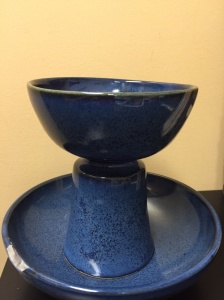Chipped Vessels
I recently traveled to the ecumenical monastic community in Taize, France (called “Taize”) with LCM’s small student vision team. This community is fascinating for a number of reasons; it’s most known for it’s contemplative worship and music, and it’s also a point of pilgrimage for hundreds if not thousands of young adults across the world EACH week. Most interesting and inspiring to me, however, is its inception as a place of reconciliation –a community born in a call to respond to the Jewish refugee crisis in 1940 – and the way that community lives out it’s call to reconciliation now.
One of the ways the brothers of Taize support this ministry is by selling pottery. I purchased this beautiful blue chalice and paten (cup and plate) to be used for communion, and shared by LCM and the community of Grace University Lutheran Church (see above). All sorts of beautiful metaphors were stirring in my mind. And then, despite carrying it on, and lugging it on trains, buses and planes, on the way home it chipped. Which was deeply disappointing to me. After some thought, however, I decided to save the plate, and use it anyway.
What a more fitting tribute to our shared humanity, our brokenness as individuals, and the way we are gathered together as Christ’s body.
Our community at LCM has long prided itself as being a place of theological and political diversity, and this year we struggled with how to live that out. There was some discord, and some division, We are, as humans and human community, almost always in need of reconciliation. We own that.
And we also proclaim that it’s into those chipped vessels, those broken places, and those cracks that God’s light shines, with power and purpose.
The team of students that traveled to Taize was called by their peers to explore a Christian community different than our own. They were also charged with bringing back and integrating those learnings into our community. After we left Taize, we spent a good chunk of our (one!) day in Paris reflecting on our year as a community, and what we might bring back so that LCM can continue growing into a thriving, generative community that bears witness to God’s love on campus.
We talked for a long time about theological diversity, what it means to claim a particular theology and still make room for difference, how we’re all (as in ALL of us) still figuring out how to do that well, and how we can to that better in the coming year. Going into our broken places is hard, and without this trip, I doubt we would have had time and space for this conversation.
We don’t yet have the answers, but again, Taize may have something to teach us. When asked about their mission of reconciliation and how they live that out, Brother Emille said that they “trust, and pray.” While that honestly seemed to be a bit naïve to me at first, when faced with our own situation it seems like the best way to proceed; trusting in God and our community that we’ll work together to bind up the broken pieces, and rooting ourselves in prayer as our starting point. I pray that it’s as simple, and as complicated, and as deep as that.
In Anthem, Leonard Cohen croons,
“Ring the bell
that still can ring.
Forget
Your perfect offering.
There is a crack
A crack
In everything.
That’s how the light gets in.
That’s how the light gets in.
This chip, this crack, in our paten/plate will continue to remind me of our time at Taize, and our striving to experience reconciliation. In the meantime, we also trust and pray that God shows up in our cracks, shining so much light and beauty and hope into our lives, into your lives, and into this world.
May it be so.
Pastor Kate

